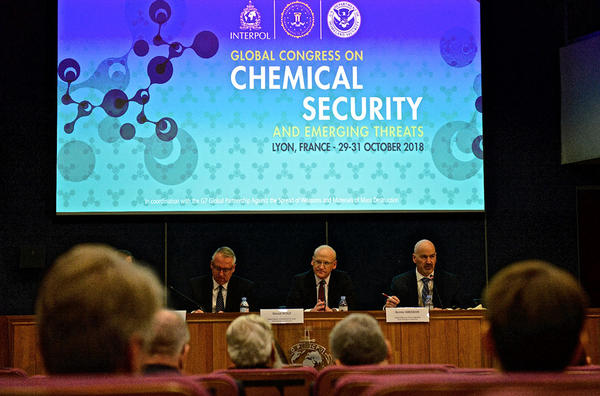WSi News2018-10-30 13:59:12
Chemical terrorism: developing a global security network
International experts working to counter the threat of chemical and explosive terrorism are gathering to develop a comprehensive network to improve global chemical safety and security.
With increasingly sophisticated methods and technologies used to carry out devastating atrocities, this first Global Congress on Chemical Security and Emerging Threats convenes a new community working to counter chemical and explosive terrorism by non-state actors and their access to chemical warfare agents, toxic industrial chemicals, explosive precursors and other emerging chemical materials.
The three-day (29 - 31 October) conference is hosted at INTERPOL’s General Secretariat headquarters and will explore specialized case studies highlighting emerging trends, identify lessons learned and best practices relating to chemical incident attribution and response, and evolving technologies and tactics. It is organized by INTERPOL, the US Department of Homeland Security and the FBI, in coordination with the G7 Partnership Against the Spread of Weapons and Materials of Mass Destruction.
“This Congress comes at a pivotal time in the international security climate. We are seeing an increase in chemical weapon usage by non-state actors both in and outside theatres of conflict. We are also seeing a steady increase in the diversion or legitimate procurement of chemical precursors used to deploy explosive devices which harm law enforcement, military and civilian populations worldwide,” said INTERPOL Secretary General Jürgen Stock.
“Whether we are from law enforcement, the military, government or industry, we all have a role to play in preventing and responding to the persistent and emerging threats in relation to chemical security,” added Mr Stock.
Experts at the Global Partnership’s Chemical Security Working Group, along with the Global Congress, have emphasized how no single country or industry is immune to terrorism, nor can either effectively deal with chemical weapons and terrorism alone. Therefore, cooperation between all related stakeholders including governments, industries, scientific institutions, and international partners using a whole-of-society approach is required.
Co-chairs of the Global Partnership Chemical Security Working Group, Trevor Smith and David Wulf said in a joint statement: “Collaboration across governments, academia, the chemical industry, and multinational organizations is essential to strengthening our collective ability to prevent future uses of weapons of mass destruction and building the necessary response capabilities.”
Bringing together some 200 delegates from nearly 40 countries, the Congress is part of efforts by INTERPOL’s CBRNE programme to help address the global threat landscape through multi-agency collaboration.
It provides a significant opportunity to close the coordination gap between law enforcement and industry in order to improve security throughout the lifecycle of chemicals of concern and develop an overarching chemical security culture.
For more information contact:
